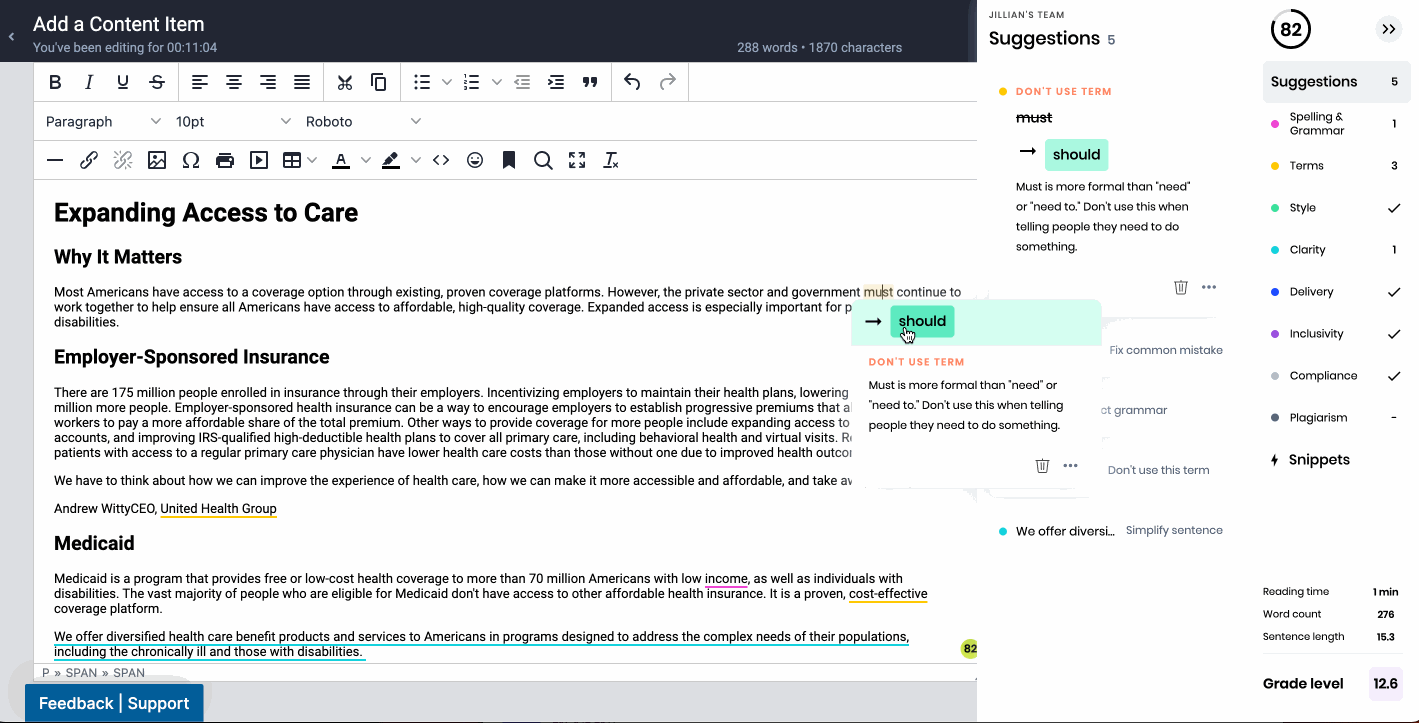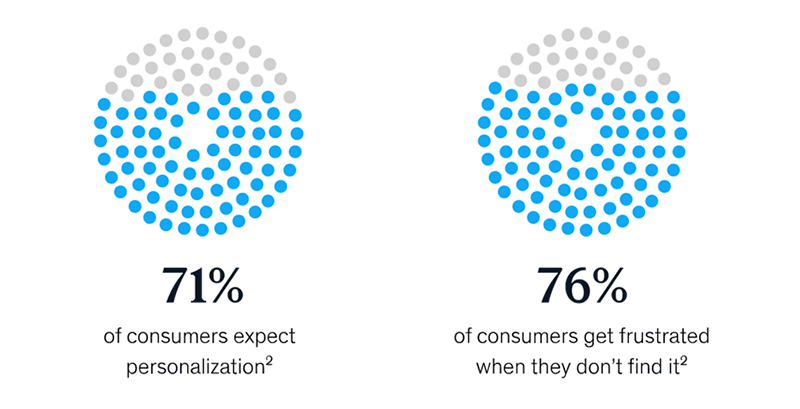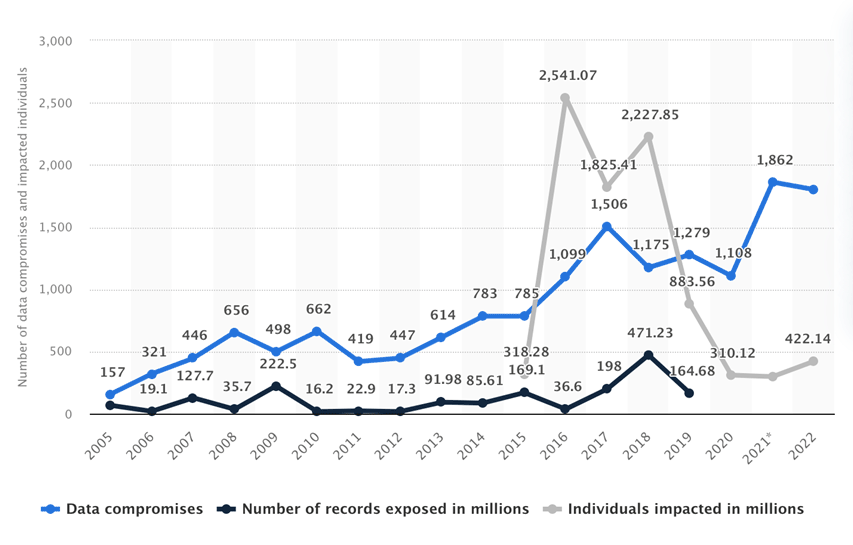Though content marketers are doing their best to evolve and incorporate artificial intelligence into their marketing efforts, most aren’t yet leveraging it to its full capacity. Only 47% trust AI to handle their ad targeting, and even less (42%) use it for content personalization.
AI isn’t going away, but that isn’t the only reason to make friends with it. The advances in machine learning will only continue, creating opportunities for those of us in the content marketing landscape to bring our A-game when implementing our strategies and going up against our competitors.
If thinking about how to use machine learning in content marketing makes you want to crawl into a closet and hide, this guide will help you move forward with more confidence. By getting in on the game now, you’ll be ahead of most competitors, so let’s dig in.
Key Takeaways:
- Machine learning is an element of artificial intelligence but isn’t the same thing as AI
- AI makes the content production process more efficient
- ML technology uses algorithms to learn patterns and predict behaviors
- Content marketers can use ML technology to understand their audience better, create better content, and improve user experience
- ML technology can help marketers broaden their reach and analyze performance
- Content teams need to address ethical issues and overcome technical challenges
- DivvyHQ can support content teams in incorporating AI and ML.
In This Article:
Getting a Handle on AI and Machine Learning in Content Marketing
Leveraging Artificial Intelligence and Machine Learning in Content Marketing
- Use Predictive Analytics To Understand Your Audience Better
- Create Content With the Help of Machine Learning
- Improve User Experience Through Personalized Content
- Reach Your Audience Using Machine Learning for Content Marketing Delivery
- Measure the Sentiment of the Room With ML Analytics
Navigating the Ethical and Technological Challenges
Using Divvy To Support Your Machine Learning in Content Marketing Efforts
Getting a Handle on AI and Machine Learning in Content Marketing
No doubt you already employ tools in your marketing efforts that use artificial intelligence, even if you aren’t aware of it. Many customer relationship management platforms incorporate it into their technologies. At Divvy, we partnered with a variety of generative AI tools to bring processes like content creation, grammar checking, and style recommendations directly into our content production environment.
However, once you understand the power of AI and ML in all areas of content marketing, you’ll be able to make full use of your tools and broaden the applications strategically.
Are AI and ML the Same Thing?
No, artificial intelligence and machine learning aren’t the same thing. Machine learning is an element of artificial intelligence, but AI doesn’t necessarily employ ML.
Both AI and ML can be leveraged to improve the content production process. The better you understand these technologies and their applications in content marketing, the more effectively you can position your team to be content marketing leaders.
With AI, you can tap software to perform mundane tasks that a human would otherwise do. These programs don’t necessarily use machine learning for content marketing-related activities. However, the tasks they do perform require prompting from humans to direct the software to perform some sort of automated task.
For example, a content operations manager might be the one to assign tasks to team members, set deadlines, and oversee the content production process to ensure assets move through it efficiently. But a writer on your team may leverage an AI tool to help with the early research, outline development, and creation of the initial draft of an asset.
At its basic level, artificial intelligence involves developing software to mimic human behaviors. However, the broader definition includes machine learning capabilities.
Machine learning takes basic artificial intelligence capabilities a step further. ML uses statistical models and algorithms to recognize and understand patterns, using those patterns to perform tasks without specific programming. An AI-generated content writing platform such as Writer can use the power of machine learning in content marketing to learn your brand’s voice and offer suggestions to creators as they craft content.
ML would also be able to analyze data to predict what your audience might like based on its behaviors. Machine learning pulls together vast amounts of data to “learn” and perform.
The learning process allows the software to analyze the data to predict possible outcomes and adjust its algorithms accordingly. You can take advantage of these processes to make strategic decisions about what to create, for whom, and when to distribute.
Leveraging Artificial Intelligence and Machine Learning in Content Marketing
AI and ML technologies are rapidly evolving. They have become game-changers for content marketers who take the opportunity to incorporate the technology to make their lives easier.
Eventually, those who don’t use this technology are likely to move slower and fall behind the competition. On the other hand, if you learn how to wield these tools effectively now, you can ride the AI revolution wave like a surfing pro, instead of letting the wave roll over you with your competition cruising the crest.
Use Predictive Analytics To Understand Your Audience Better
We all understand that effective marketing requires us to understand our audiences. We (hopefully) create audience personas to define our target customer’s pain points, interests, and questions. However, doing this well requires a significant time — and financial — investment as you dedicate team members to conduct the research needed.
One of the newer applications of machine learning in content marketing is predictive analytics. Predictive analytics is the closest thing we have to a crystal ball, allowing you to identify future audience needs based on past behaviors. This can be a gamechanger that allows you to optimize your content strategy by:
- Providing insights into content topics and formats your audience will prefer in the future
- Establishing ideal content length (for video and text formats)
- Determining changes in interests before your content grows stale
- Allocating target customers to audience segments according to browser and engagement behaviors
- Automatically tagging content based on content material
Using a machine to gain these insights without complex programming is revolutionary for content marketers.
Create Content With the Help of Machine Learning
When you understand what your audience wants to see from content, you can create content that meets their needs. Another way savvy marketers are using machine learning for content marketing is as a writing support.
The advent of ChatGPT and the resulting explosion of generative AI programs offer content marketers a serious productivity boost. These programs use natural language models to learn how humans communicate and apply that learning to text creation.
However, plugging a topic into a standard open-source AI such as OpenAI’s ChatGPT, Google’s LaMDA, or Meta’s LLaMA won’t return results that will wow your audience. Though these sources can provide content that sounds like a human wrote it, it won’t sound like your brand.
Instead, you need to employ software that trains on your existing content to learn your brand’s voice. Writer and Jasper are two of the most advanced generative content creation platforms.
These programs don’t merely push out generic content but imitate your brand’s tone, language, values, and even visuals. They provide helpful first drafts, topic ideas, outlines, and writing coaching for your creatives. Keep in mind, though, that you should not use them to create polished content products unless you want to see your audience’s engagement tank.
Improve User Experience Through Personalized Content
Your team can use machine learning for content marketing personalization. Most consumers expect personalized content and are frustrated when they don’t get it.
Source: McKinsey & Company
Artificial intelligence tools allow you to tailor the content your audience sees based on your chosen audience segments, including where they are on the buyer’s journey. With machine learning, your audience will see content recommendations and receive real-time personalized and customized content based on their current behaviors and preferences.
Programs that use ML for personalization are dynamic and responsive to your audience’s immediate needs. They might offer assistance through a chatbot using natural language generation or provide more in-depth product information for a customer who has been pondering a purchase but hasn’t made a final decision.
AI and ML give you the power to supercharge your personalization efforts. Your audience’s user experience will improve significantly, leading to higher conversion rates and more brand fans.
Reach Your Audience Using Machine Learning for Content Marketing Delivery
We all know the importance of reaching the right customers in the right place at the right time with the right content. Divvy’s dynamic content calendar helps you plan and schedule content so you know your audience will receive content through their favored channels when they are online.
Machine learning helps you understand when that is and can deliver your content without manual efforts from you. The better machine learning programs get, the more nuanced your content delivery schedule will become.
For instance, instead of using research from others or conducting your own to determine when to post on social media, AI will do the work for you. It allows you to use machine learning in content marketing to understand when your audience is online on each channel you use, and then deliver the content at that time.
You won’t need to guestimate based on blanket recommendations that cover all industries. The software will have up-to-date and real-time data and use that information to post at the times you are likely to see the most engagement.
Measure the Sentiment of the Room With ML Analytics
Content marketing is never static. Even if you use AI and ML for each step of the process, you need to understand how well your content performs and adjust your strategy regularly.
Content analytics can be tedious and — let’s face it — really hard. Fortunately, if you use Divvy’s platform, we make your job easier by pulling data from all your data sources, analyzing it according to your key performance indicators, and generating dashboards and reports to share with executives.
With machine learning in content marketing, you can use analytics to dig even deeper into large amounts of data. Using sentiment analysis algorithms, ML programs evaluate data such as social media engagement, user reviews, and email responses to determine your audience’s responsiveness to your content.
Gaining a nuanced understanding of content performance allows you to adjust and adapt to ongoing and changing audience sentiment and needs. You can then incorporate any strategy changes into your content production cycle, using AI and ML to continue to move you efficiently through the process.
Navigating the Ethical and Technological Challenges
AI and ML provide content marketers with new opportunities to scale their marketing efforts to reach a broader audience with relevant and timely content. However, as exciting as the possibilities are, using artificial intelligence and machine learning in content marketing presents ethical and technological challenges, and we would be remiss if we didn’t address them.
Ethical Challenges
The ethical challenges using AI and ML present are significant but not necessarily insurmountable. Your organization and team will need to do their due diligence to ensure your content production process and the content itself adheres to ethical standards, guarding against:
- Security and privacy breaches: Cybersecurity is a tremendous concern for all businesses. Incorporating AI and ML heightens those concerns, as these programs necessarily handle large volumes of data, increasing the risk of breaches and theft. The challenge is even greater for industries with data privacy and security regulatory requirements.
- Algorithmic bias: Artificial intelligence and machine learning in content marketing require training the software on data. What the AI learns depends on the data available for training. If that data contains biases, so will the software’s content or the information it provides leading to discrimination and stereotyping.
- Misinformation: Similar to algorithmic bias is the potential for misinformation. AI doesn’t know fact from fiction, so while it can produce compelling and human-sounding content, the details might be false. The more untrue information it produces, the more AI will learn from incorrect information, perpetuating the proliferation and spread of misinformation.
You can overcome each of these challenges by implementing safeguards.
Source: Statista
Employ software that adheres to security standards using multiple measures. Understand the data you use to train the software and have a human review it for biases. Always have your team members fact-check content, including those using machine learning for content marketing asset creation.
Technological Challenges
Artificial intelligence technologies are changing so fast it can make your head spin. The barrage of new products on the market is overwhelming, and it seems there are product updates involving new capabilities every time you turn around.
One of the biggest challenges you will face is staying on top of these changes going forward. Choosing your initial platforms won’t be easy, but sticking with one might be harder when the next shiny new program promises miracles. We recommend taking the time to find a product that meets your needs now but has the potential to grow with you.
You will also need to ensure you have the architecture in place to support using AI and ML. Your system should be able to manage large amounts of data and integrate with the systems and tools you already use.
Using Divvy To Support Your Machine Learning in Content Marketing Efforts
At Divvy, we understand the importance of creating relevant, engaging, and timely content at scale, and we also know how hard this is to achieve. We developed our platform to help you get there.
Our platform offers a central hub for all your content marketing needs, including integrations that will let you seamlessly incorporate artificial intelligence and machine learning for content marketing. Request a demo today to discover how we eliminate content chaos.



